Forensic Psychology Report: Case Analysis of Eric and Legal Standards
VerifiedAdded on 2023/01/19
|5
|1177
|70
Report
AI Summary
This report delves into forensic psychology, examining the concepts of competency to stand trial and the insanity defense through the analysis of a case involving an individual named Eric. The report explores the Dusky standard for competency, the role of forensic practitioners, and the legal standards applied. It also addresses the M'Naghten Rule and the irresistible impulse test in relation to the insanity defense. The author, acting as a juror, discusses their ruling based on the provided information, including the impact of emotional reactions on decision-making. The report concludes with a reflection on the judges' ruling and its implications, emphasizing the importance of forensic evaluations in criminal cases. The report covers the key aspects of forensic psychology, including the evaluation process, legal standards, and the application of these principles in a real-world scenario.
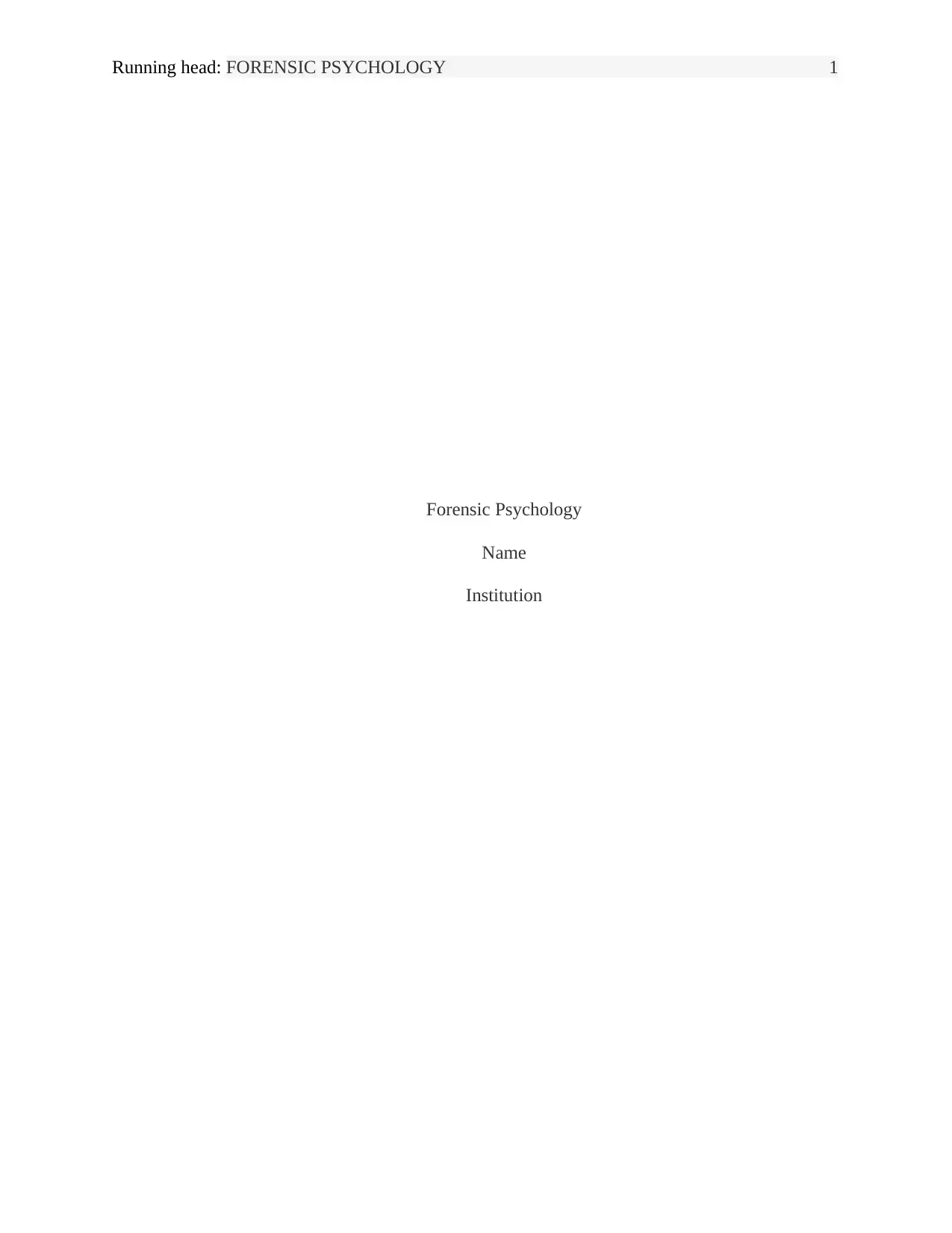
Running head: FORENSIC PSYCHOLOGY 1
Forensic Psychology
Name
Institution
Forensic Psychology
Name
Institution
Paraphrase This Document
Need a fresh take? Get an instant paraphrase of this document with our AI Paraphraser
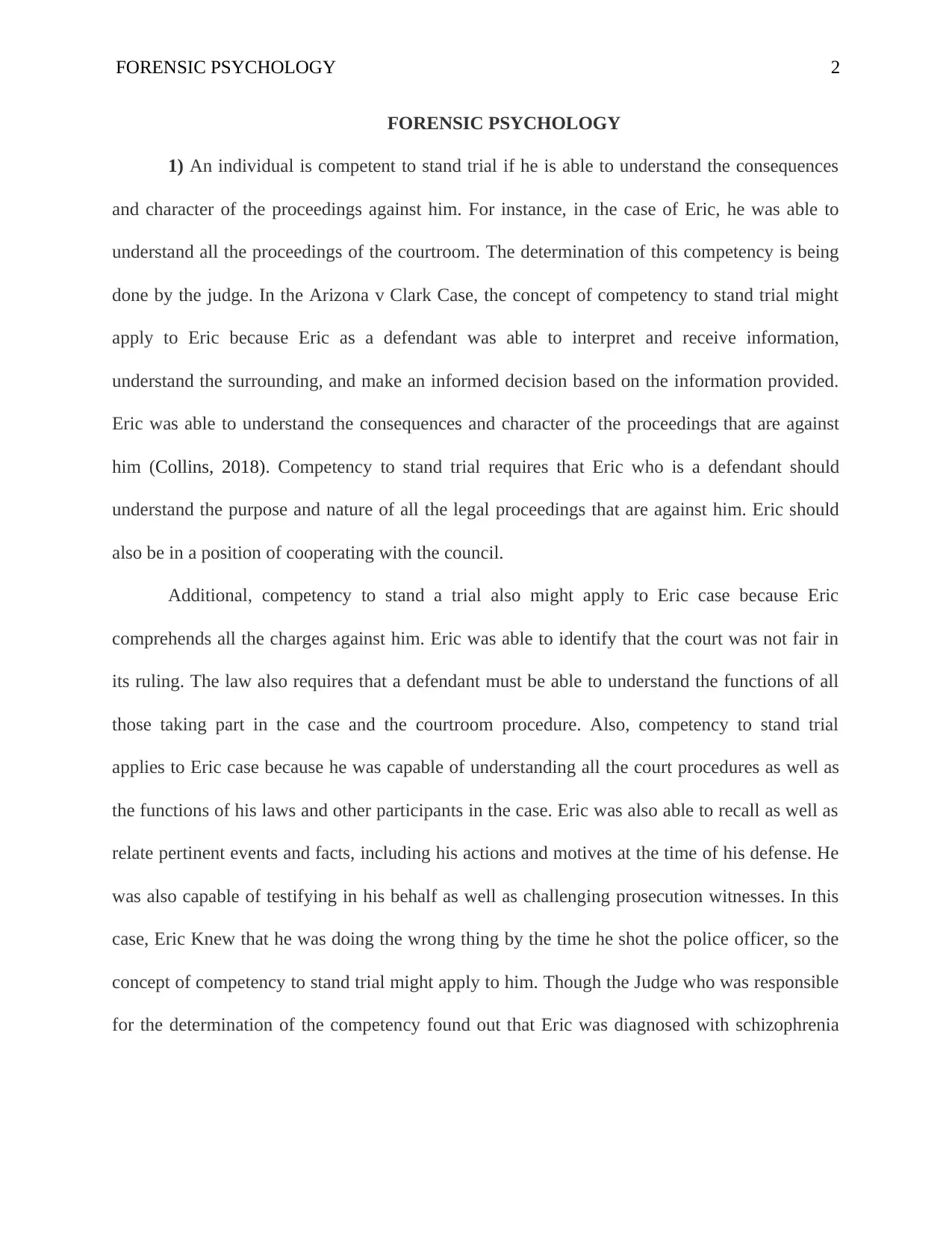
FORENSIC PSYCHOLOGY 2
FORENSIC PSYCHOLOGY
1) An individual is competent to stand trial if he is able to understand the consequences
and character of the proceedings against him. For instance, in the case of Eric, he was able to
understand all the proceedings of the courtroom. The determination of this competency is being
done by the judge. In the Arizona v Clark Case, the concept of competency to stand trial might
apply to Eric because Eric as a defendant was able to interpret and receive information,
understand the surrounding, and make an informed decision based on the information provided.
Eric was able to understand the consequences and character of the proceedings that are against
him (Collins, 2018). Competency to stand trial requires that Eric who is a defendant should
understand the purpose and nature of all the legal proceedings that are against him. Eric should
also be in a position of cooperating with the council.
Additional, competency to stand a trial also might apply to Eric case because Eric
comprehends all the charges against him. Eric was able to identify that the court was not fair in
its ruling. The law also requires that a defendant must be able to understand the functions of all
those taking part in the case and the courtroom procedure. Also, competency to stand trial
applies to Eric case because he was capable of understanding all the court procedures as well as
the functions of his laws and other participants in the case. Eric was also able to recall as well as
relate pertinent events and facts, including his actions and motives at the time of his defense. He
was also capable of testifying in his behalf as well as challenging prosecution witnesses. In this
case, Eric Knew that he was doing the wrong thing by the time he shot the police officer, so the
concept of competency to stand trial might apply to him. Though the Judge who was responsible
for the determination of the competency found out that Eric was diagnosed with schizophrenia
FORENSIC PSYCHOLOGY
1) An individual is competent to stand trial if he is able to understand the consequences
and character of the proceedings against him. For instance, in the case of Eric, he was able to
understand all the proceedings of the courtroom. The determination of this competency is being
done by the judge. In the Arizona v Clark Case, the concept of competency to stand trial might
apply to Eric because Eric as a defendant was able to interpret and receive information,
understand the surrounding, and make an informed decision based on the information provided.
Eric was able to understand the consequences and character of the proceedings that are against
him (Collins, 2018). Competency to stand trial requires that Eric who is a defendant should
understand the purpose and nature of all the legal proceedings that are against him. Eric should
also be in a position of cooperating with the council.
Additional, competency to stand a trial also might apply to Eric case because Eric
comprehends all the charges against him. Eric was able to identify that the court was not fair in
its ruling. The law also requires that a defendant must be able to understand the functions of all
those taking part in the case and the courtroom procedure. Also, competency to stand trial
applies to Eric case because he was capable of understanding all the court procedures as well as
the functions of his laws and other participants in the case. Eric was also able to recall as well as
relate pertinent events and facts, including his actions and motives at the time of his defense. He
was also capable of testifying in his behalf as well as challenging prosecution witnesses. In this
case, Eric Knew that he was doing the wrong thing by the time he shot the police officer, so the
concept of competency to stand trial might apply to him. Though the Judge who was responsible
for the determination of the competency found out that Eric was diagnosed with schizophrenia
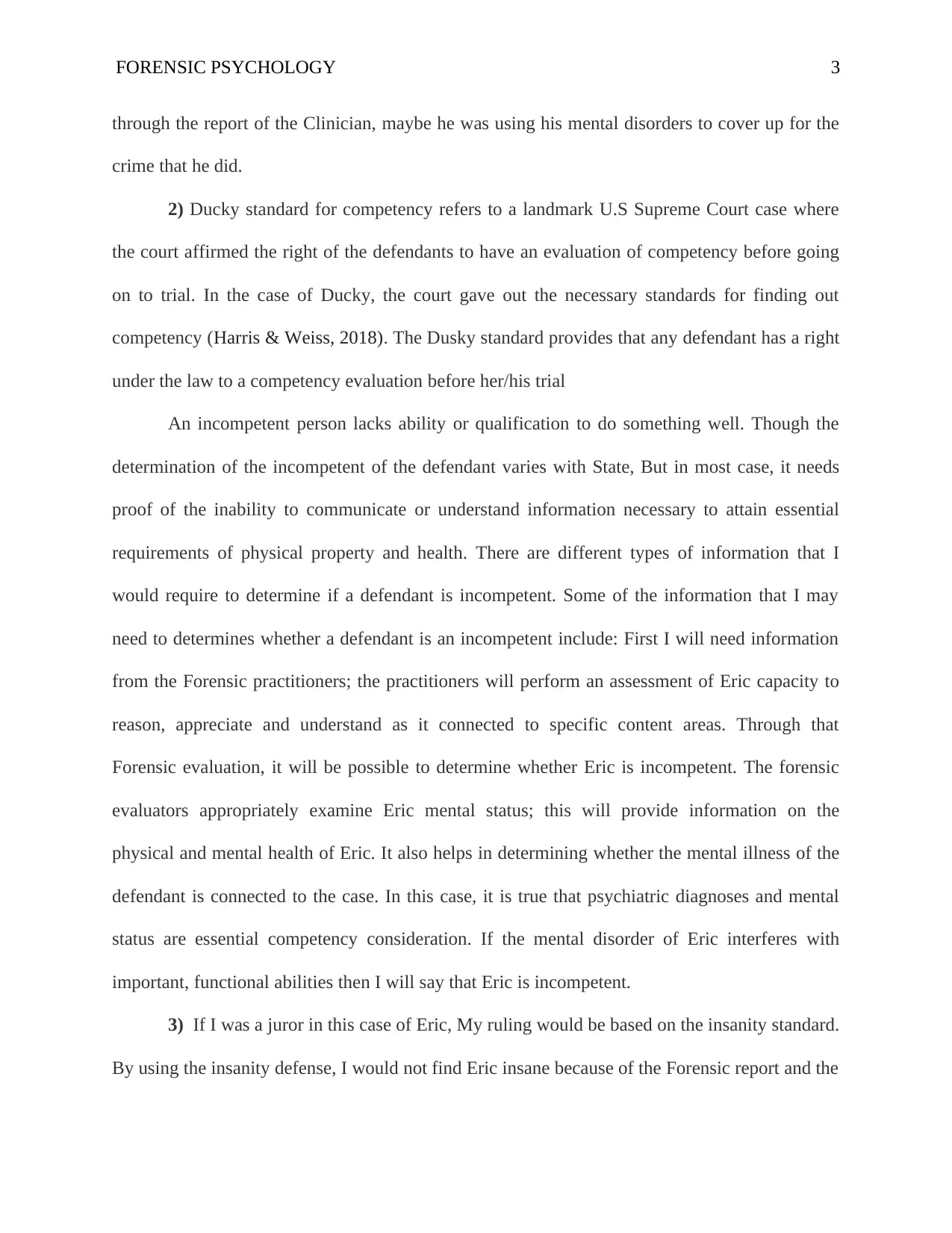
FORENSIC PSYCHOLOGY 3
through the report of the Clinician, maybe he was using his mental disorders to cover up for the
crime that he did.
2) Ducky standard for competency refers to a landmark U.S Supreme Court case where
the court affirmed the right of the defendants to have an evaluation of competency before going
on to trial. In the case of Ducky, the court gave out the necessary standards for finding out
competency (Harris & Weiss, 2018). The Dusky standard provides that any defendant has a right
under the law to a competency evaluation before her/his trial
An incompetent person lacks ability or qualification to do something well. Though the
determination of the incompetent of the defendant varies with State, But in most case, it needs
proof of the inability to communicate or understand information necessary to attain essential
requirements of physical property and health. There are different types of information that I
would require to determine if a defendant is incompetent. Some of the information that I may
need to determines whether a defendant is an incompetent include: First I will need information
from the Forensic practitioners; the practitioners will perform an assessment of Eric capacity to
reason, appreciate and understand as it connected to specific content areas. Through that
Forensic evaluation, it will be possible to determine whether Eric is incompetent. The forensic
evaluators appropriately examine Eric mental status; this will provide information on the
physical and mental health of Eric. It also helps in determining whether the mental illness of the
defendant is connected to the case. In this case, it is true that psychiatric diagnoses and mental
status are essential competency consideration. If the mental disorder of Eric interferes with
important, functional abilities then I will say that Eric is incompetent.
3) If I was a juror in this case of Eric, My ruling would be based on the insanity standard.
By using the insanity defense, I would not find Eric insane because of the Forensic report and the
through the report of the Clinician, maybe he was using his mental disorders to cover up for the
crime that he did.
2) Ducky standard for competency refers to a landmark U.S Supreme Court case where
the court affirmed the right of the defendants to have an evaluation of competency before going
on to trial. In the case of Ducky, the court gave out the necessary standards for finding out
competency (Harris & Weiss, 2018). The Dusky standard provides that any defendant has a right
under the law to a competency evaluation before her/his trial
An incompetent person lacks ability or qualification to do something well. Though the
determination of the incompetent of the defendant varies with State, But in most case, it needs
proof of the inability to communicate or understand information necessary to attain essential
requirements of physical property and health. There are different types of information that I
would require to determine if a defendant is incompetent. Some of the information that I may
need to determines whether a defendant is an incompetent include: First I will need information
from the Forensic practitioners; the practitioners will perform an assessment of Eric capacity to
reason, appreciate and understand as it connected to specific content areas. Through that
Forensic evaluation, it will be possible to determine whether Eric is incompetent. The forensic
evaluators appropriately examine Eric mental status; this will provide information on the
physical and mental health of Eric. It also helps in determining whether the mental illness of the
defendant is connected to the case. In this case, it is true that psychiatric diagnoses and mental
status are essential competency consideration. If the mental disorder of Eric interferes with
important, functional abilities then I will say that Eric is incompetent.
3) If I was a juror in this case of Eric, My ruling would be based on the insanity standard.
By using the insanity defense, I would not find Eric insane because of the Forensic report and the
⊘ This is a preview!⊘
Do you want full access?
Subscribe today to unlock all pages.

Trusted by 1+ million students worldwide
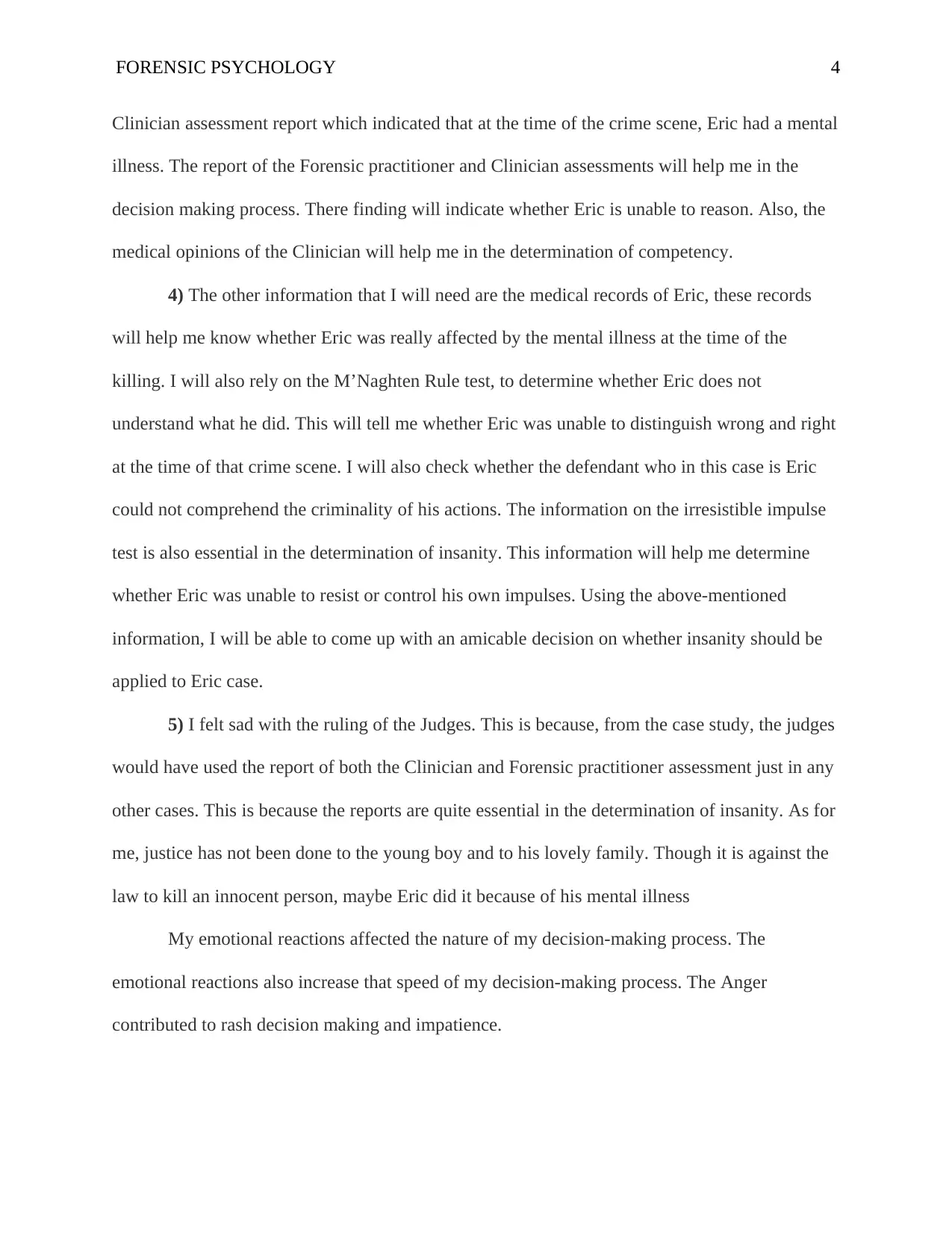
FORENSIC PSYCHOLOGY 4
Clinician assessment report which indicated that at the time of the crime scene, Eric had a mental
illness. The report of the Forensic practitioner and Clinician assessments will help me in the
decision making process. There finding will indicate whether Eric is unable to reason. Also, the
medical opinions of the Clinician will help me in the determination of competency.
4) The other information that I will need are the medical records of Eric, these records
will help me know whether Eric was really affected by the mental illness at the time of the
killing. I will also rely on the M’Naghten Rule test, to determine whether Eric does not
understand what he did. This will tell me whether Eric was unable to distinguish wrong and right
at the time of that crime scene. I will also check whether the defendant who in this case is Eric
could not comprehend the criminality of his actions. The information on the irresistible impulse
test is also essential in the determination of insanity. This information will help me determine
whether Eric was unable to resist or control his own impulses. Using the above-mentioned
information, I will be able to come up with an amicable decision on whether insanity should be
applied to Eric case.
5) I felt sad with the ruling of the Judges. This is because, from the case study, the judges
would have used the report of both the Clinician and Forensic practitioner assessment just in any
other cases. This is because the reports are quite essential in the determination of insanity. As for
me, justice has not been done to the young boy and to his lovely family. Though it is against the
law to kill an innocent person, maybe Eric did it because of his mental illness
My emotional reactions affected the nature of my decision-making process. The
emotional reactions also increase that speed of my decision-making process. The Anger
contributed to rash decision making and impatience.
Clinician assessment report which indicated that at the time of the crime scene, Eric had a mental
illness. The report of the Forensic practitioner and Clinician assessments will help me in the
decision making process. There finding will indicate whether Eric is unable to reason. Also, the
medical opinions of the Clinician will help me in the determination of competency.
4) The other information that I will need are the medical records of Eric, these records
will help me know whether Eric was really affected by the mental illness at the time of the
killing. I will also rely on the M’Naghten Rule test, to determine whether Eric does not
understand what he did. This will tell me whether Eric was unable to distinguish wrong and right
at the time of that crime scene. I will also check whether the defendant who in this case is Eric
could not comprehend the criminality of his actions. The information on the irresistible impulse
test is also essential in the determination of insanity. This information will help me determine
whether Eric was unable to resist or control his own impulses. Using the above-mentioned
information, I will be able to come up with an amicable decision on whether insanity should be
applied to Eric case.
5) I felt sad with the ruling of the Judges. This is because, from the case study, the judges
would have used the report of both the Clinician and Forensic practitioner assessment just in any
other cases. This is because the reports are quite essential in the determination of insanity. As for
me, justice has not been done to the young boy and to his lovely family. Though it is against the
law to kill an innocent person, maybe Eric did it because of his mental illness
My emotional reactions affected the nature of my decision-making process. The
emotional reactions also increase that speed of my decision-making process. The Anger
contributed to rash decision making and impatience.
Paraphrase This Document
Need a fresh take? Get an instant paraphrase of this document with our AI Paraphraser
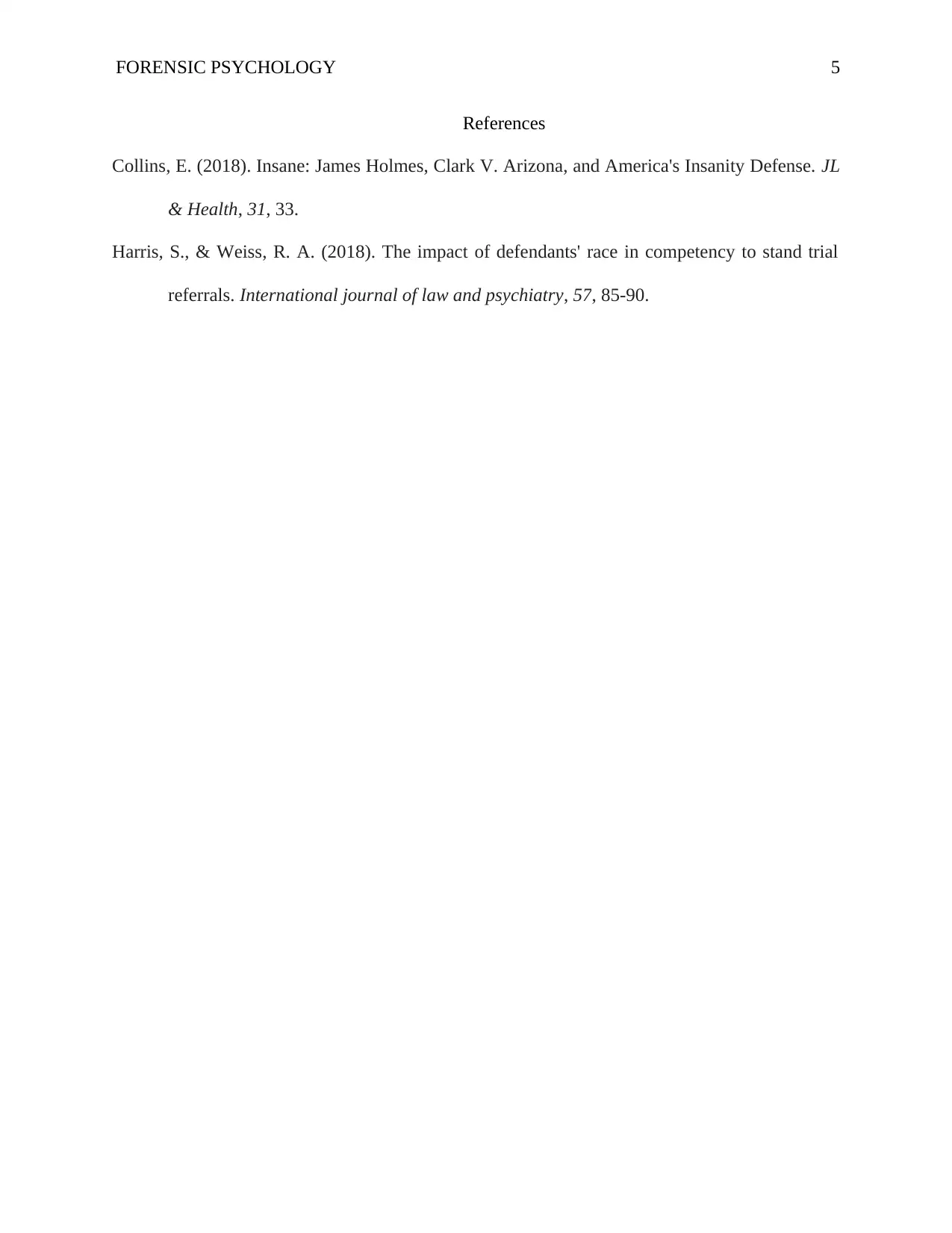
FORENSIC PSYCHOLOGY 5
References
Collins, E. (2018). Insane: James Holmes, Clark V. Arizona, and America's Insanity Defense. JL
& Health, 31, 33.
Harris, S., & Weiss, R. A. (2018). The impact of defendants' race in competency to stand trial
referrals. International journal of law and psychiatry, 57, 85-90.
References
Collins, E. (2018). Insane: James Holmes, Clark V. Arizona, and America's Insanity Defense. JL
& Health, 31, 33.
Harris, S., & Weiss, R. A. (2018). The impact of defendants' race in competency to stand trial
referrals. International journal of law and psychiatry, 57, 85-90.
1 out of 5
Related Documents
Your All-in-One AI-Powered Toolkit for Academic Success.
+13062052269
info@desklib.com
Available 24*7 on WhatsApp / Email
![[object Object]](/_next/static/media/star-bottom.7253800d.svg)
Unlock your academic potential
Copyright © 2020–2026 A2Z Services. All Rights Reserved. Developed and managed by ZUCOL.





